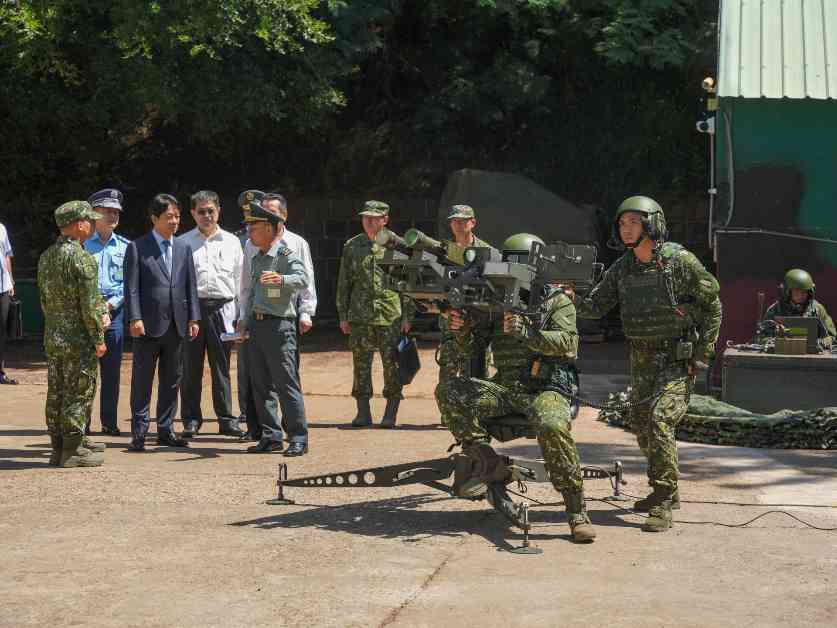China Imposes Sanctions on US Defense Companies for Selling Arms to Taiwan
China has imposed sanctions on nine US defense firms over sales of military equipment to Taiwan, as Beijing continues to raise pressure on the island and demand that Washington end support for its declarations of independence.
The Ministry of Foreign Affairs in Beijing announced the measures on Wednesday, freezing the property of the nine firms on its territory and prohibiting all transactions with China-based people or entities with immediate effect.
Spokesman Lin Jian stated that US weapon sales to “China’s Taiwan region” had “seriously violated the one-China principle, infringed upon China’s sovereignty and security interests, and damaged China-US relations.” He announced that Beijing was taking “resolute countermeasures” against the companies involved.
The affected firms include Sierra Nevada Corporation, Stick Rudder Enterprises, Cubic Corporation, S3 Aerospace, TCOM Ltd Partnership, TextOre, Planate Management Group, ACT1 Federal, and Exovera.
The US State Department had recently approved the possible sale of spare parts valued at about $228 million to Taiwan’s military. Taiwan’s defense ministry welcomed the sales package, stating that it would help maintain combat readiness and become effective within a month.
China views Taiwan as its own territory and has been ramping up military and political pressure on the island in recent years. Despite the US switching diplomatic recognition to Beijing in 1979, it remains Taiwan’s most important partner and largest arms supplier, leading to repeated condemnations from China.
Subheadings:
China’s Stance on Taiwan
US-China Relations and Taiwan
Implications of Sanctions on US Defense Companies
Beijing has repeatedly demanded that the US stop supporting Taiwan independence and undermining peace in the Taiwan Strait. The Chinese government considers Taiwan’s status as a red line that cannot be crossed in China-US relations.
In recent years, China and the US have clashed on various issues, including trade, technology access, and Beijing’s actions in the South China Sea. White House aide Jake Sullivan met with high-ranking Chinese military official Zhang Youxia last month, where Zhang emphasized the importance of halting military collusion with Taiwan.
China’s Stance on Taiwan
China considers Taiwan a part of its territory and has been pushing for reunification under the “one country, two systems” framework. However, Taiwan has rejected this proposal, asserting its sovereignty and democratic governance.
The Chinese government sees any support for Taiwan’s independence as a threat to its territorial integrity and national security. As a result, Beijing has been increasing military activities near Taiwan, conducting drills and sending warplanes into Taiwan’s air defense identification zone.
US-China Relations and Taiwan
The US has maintained a strong relationship with Taiwan despite officially recognizing Beijing as the legitimate government of China. This has led to tensions between the US and China, as Washington continues to provide military support to Taipei, including arms sales and defense cooperation.
The recent sanctions imposed by China on US defense companies highlight the ongoing disagreements between the two superpowers over Taiwan. Beijing sees the US support for Taiwan as a violation of its sovereignty and a threat to its national security, leading to retaliatory measures.
Implications of Sanctions on US Defense Companies
The sanctions imposed by China on nine US defense firms will have significant implications for both countries. The affected companies will face restrictions on their operations in China, potentially leading to financial losses and damage to their reputation.
Furthermore, the sanctions could impact future defense cooperation between the US and China, as tensions over Taiwan continue to escalate. The move by Beijing signals its determination to challenge US influence in the region and defend its territorial claims.
In conclusion, the sanctions imposed by China on US defense companies for selling arms to Taiwan underscore the complex and contentious relationship between the two countries. As tensions over Taiwan persist, both sides must navigate carefully to avoid further escalation and maintain stability in the region.



























